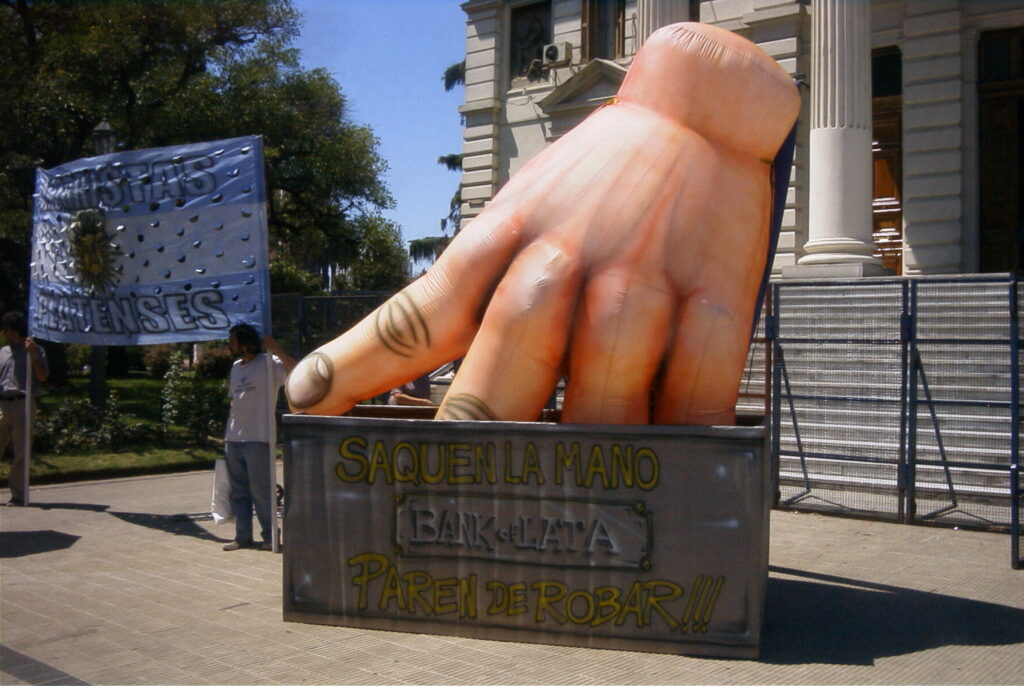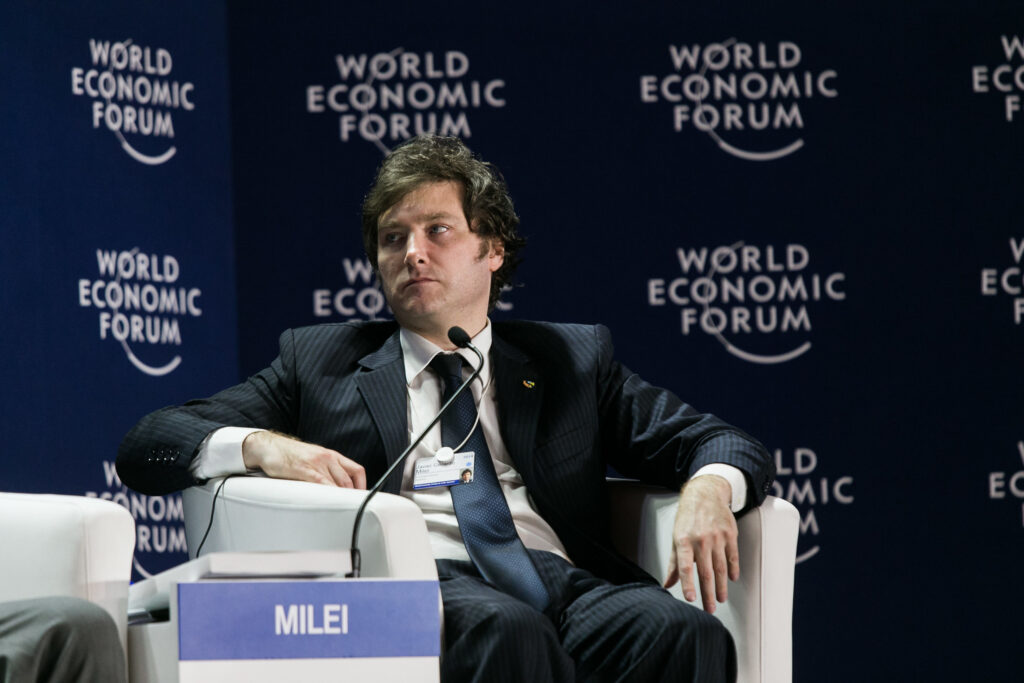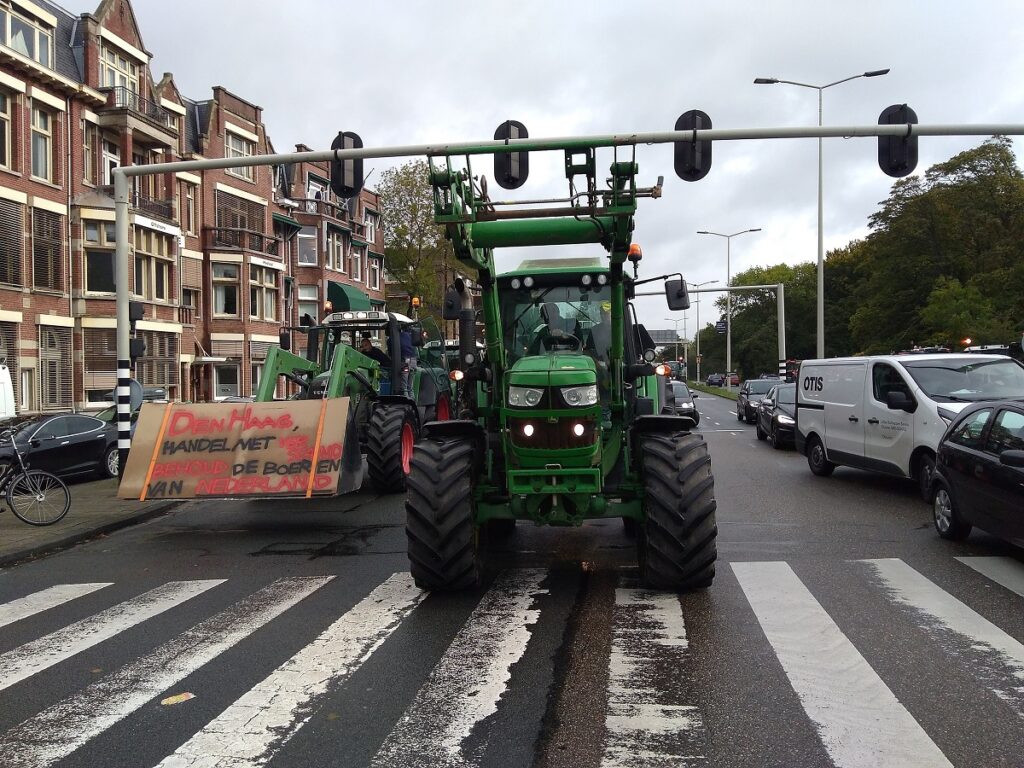In recent work, several authors in anthropology have analyzed how the extreme right is being configured and acquiring a considerable pull on the mainstream (see: Kalb, 2023a; Semán & Wilkis, 2023, https://www.focaalblog.com/2023/05/11/pablo-seman-and-ariel-wilkis-rebellion-of-the-bastards-the-rise-of-the-extreme-right-in-argentina/). I want to take their reflections further and focus on the uncomfortable question about the role of “traditional” political forces in paving the way for the emergence of this neofascism. I do this from a particular vantage point in Argentina and the Southern-Cone of the Americas.
This is not about denying the existence of geopolitical interests and (transnational) capital that provide funding and platforms for the extreme right. However, the situational configuration of their advance in each country cannot be explained without considering the failure of established political representations. Not only have they failed to generate new consensual programmatic agreements, but they are also disconnected – almost pathologically – from the political needs and sensitivities of people in life contexts of overwhelming precariousness and insecurity. Engaged in palace disputes for a little place in the sun, political coalitions of several South American countries have been speaking their own language, increasingly alien to the people on the street who are trying to get by with putting food on the table, for a start.
In 2018, anthropologist Silvina Merenson and I were carrying out fieldwork in two southern Brazilian states during the elections that brought Jair Bolsonaro to the presidency. Merenson dialogued with higher-income families while I interviewed female domestic workers, shopkeepers, smugglers, and trans-border farmers. To our surprise, these interviews with such different groups turned out to have common political denominators. Time and again, they expressed that living conditions had worsened, that expectations for the future were being destroyed, and that more and more sacrifices were demanded of them in aspects of life considered fundamental. They also expressed a loss of confidence in the political representatives of the Workers’ Party (PT) and the center-right parties due to the corruption scandals insistently reported by the media. Their narratives conveyed an ingrained weariness with representations from across the political spectrum’s inability to provide solutions to social anxieties.
In conversations with academic colleagues and militants of the then-PT candidate, we made clear our concern that the speeches on the good deeds of the PT governments were a mistake. People had reached a point of saturation: they needed to believe that something radically different was coming. This wish took on an almost messianic character in Brazil: the evangelical churches supported the extreme-right candidate and were key in constructing a collective “faith” in his smoothness and capabilities. In short, we had ethnographically identified a political “crossing point” for the sacrifice of people’s future horizons and their basic minimum needs. Once this limit is crossed, the weariness becomes multi-dimensional (social, psychological, physical), and society can no longer be asked to give more of itself. Exhaustion, anger, tiredness, faith, and hope: this is the combo of collective sensitivities provoked by crossing this limit, and the extreme right in Brazil knew how to capitalize on it by putting up a new messiah.
This July, I conducted fieldwork in cities in northern, central, and southern Chile, interviewing 50 female social science researchers in the country’s universities. These conversations revealed a state of fear on the part of the female colleagues on two fronts. First, regarding the stalking done by the extreme right and its slow and planned victory in the fight for Gramsci’s common sense, and second, the fact that the government was facilitating this process with “errors” (forced or not) that they found “inexplicable”.
In 2021, Gabriel Boric represented a left-wing coalition Apruebo Dignidad [Approve Dignity] made up of non-traditional political parties, organized by the student movements. His discourse was based on the criticism of the coalitions (center-left and right-wing) that had led the democratic transition since 1990 while ensuring the persistence of Pinochet’s neoliberalism. Boric won the presidential ballot in December 2021 (55.9% of the votes), beating the extreme-right candidate José Antonio Kast (44.1%). However, from the start of his government (in March 2022), strategic errors have caused widespread surprise. The first was the trip by the then Minister of Interior and Security, Izkia Siches, to mediate the Mapuche conflict in southern Chile with no prior agreements with Indigenous leaders or security planning. A female sociologist with extensive experience advising presidential administrations recounted her astonishment on seeing on television the minister being driven out of the area under gunfire: “They have a misplaced voluntarist vision. They assumed that they could discuss a territorial conflict that dates back 300 years, talk to a family whose son had been shot by state security forces, and say ‘you can trust me, I am a new type of State’”.
The director of a Chilean alternative media organization reported that he lost his best professionals in writing, audiovisual editing, and formulation of web content in the days of the convention for the proposed constitution in 2021. A network of organized businesspeople offered these professionals huge salaries to produce multimedia materials defaming the constituent process. This campaign was effective in the context of the post-pandemic crisis, inflation, rising food prices, and increased violence from drug-trafficking networks. With communicative astuteness, they managed to associate all of this with the new government and the new constitution (which was rejected in a plebiscite in September 2022).
Since then, the government has been involved in absurd corruption scandals. Allegations of several cases of fraud involved the Ministry of Social Development, headed by Giorgio Jackson, a preeminent figure of the government’s alliance. One of them concerns fraudulent agreements with NGOs led by political representatives of Jackson’s party in northern Chile. Another is about small funds for social works being used to purchase branded lingerie for a female political representative from the south of the country. On July 19, a man claiming to be the minister called a security guard of the Ministry of Social Development and ordered him to gather up 50 computers. The guard handed over 23 computers to three hooded subjects, who later returned and took away a safe. With all major media outlets aligned with the right or the extreme right, these events caused a media tsunami. Officially, the government sought to characterize this as part of a destabilization coup orchestrated by the right. This did not even convince the allied rank and file: Jackson resigned on August 11. Our female interviewees are now taking a Kast victory in the next presidential elections (in 2025) for granted. A female political scientist and militant in Boric’s front, now disillusioned, concluded: “The only way Kast will not win is if he doesn’t run”.
For a quick summary of the Chilean democratic mess: Three decades after the democratic transition, reigning political coalitions had sustained and deepened the neo-liberal model, blatantly failing to fulfill egalitarian promises of social ascent through personal effort. The social explosion of 2019 signified the outburst of dissatisfaction with these unfulfilled promises. Popular dissatisfaction was aggravated by the pandemic crisis and was capitalized on by young leaders who proposed a “new way of doing politics” and granting “dignity” to the people. This promise provided a representational outlet for popular anguish, but once in power, the new governing class was caught up by its promises and vulnerable for renewed accusations of corruption. The level of dissatisfaction with democracy grew, and people, desperate to get ahead after years of crushing and cyclical crises, turned to quick solutions that were easy to execute. Faced with adversity, complexity, and disappointment, people prefer to rely on the sense of predictability of the conservative social hierarchy that the far-right offers (see Kalb, 2023a). Talking with taxi drivers, concierges, domestic workers, and small shopkeepers in the Chilean cities I passed through during this spring, I heard again the same phrases that we recorded with Merenson in Brazil in 2018.
I returned to Argentina days before the August 13 “Simultaneous and Mandatory Open and Primary elections” (PASO). The country I returned to was even more distressed than when I had left. Argentina is going through dizzying political times, plunged into a swirl of agonistic conflicts. Institutional, economic, and political instability is linked to what they call here (borrowing from Gramsci) the “hegemonic standoff”. Between 2008 and 2022, the country was deeply divided between political forces with opposing visions. It was common to note a “grieta” [rift] between the picture of the country represented by these two blocs. This expression is not the result of poetic license. Its linguistic use has been consolidated in Argentina: it deals with the bellicose configuration of two sides in a latent state of permanent aggression. Since 2022, this latency has given way to episodes of de facto mutual violence.
Until 2022, we had the Peronist coalition on one side of the grieta, based in a myriad of heterogeneous parties and forces, ranging from the left to the right, and whose pacts and configurations vary in different cities and provinces. In recent years, this coalition has been called Frente para la Victoria [Front for Victory], Frente de Todos [Front for Everyone], and the current Unión por la Patria [Union for the Homeland]. The most important political force within the front was, until 2022, Cristina Kirchner and the faction that bears the surname of her late husband (Néstor Kirchner), namely Kirchnerismo. Despite the heterogeneity, a transcendent Peronist identity allows transversal alliances in certain historical moments. Defining this identity is not easy, but it is generally associated with a redistributive perspective on the State, an anti-neoliberal discourse (although policies do not always reflect this), the continued expansion of social rights, development policies, financial sovereignty, and the idea that the popular sectors (=lower-income) are the identity core of the country.
On the other side of the “grieta”, again until 2022, there was Juntos por el Cambio [Together for Change], the coalition with a neoliberal perspective, also composed of heterogeneous national and provincial forces. The best known are the Propuesta Republicana [Republican Proposal] (PRO) of former President Mauricio Macri and the Unión Cívica Radical [Radical Civil Union]. Macri led this coalition and won the 2015 presidential elections initiating a government that brutally deteriorated living conditions. In his term, the Gross Domestic Product (GDP) receded on average 4.3% annually; the annual inflation rate went from 30.5% to 60%. The dollar increased its value by 548% (sic!). In December 2019, 40.8% of people were living below the poverty line. Seeking his reelection, Macri signed the most important bailout in the history of Argentina and the International Monetary Fund (IMF) for the sum of 57 billion dollars (45 of which were delivered to the country). The IMF and the government agreed a policy of austerity which drastically worsened living conditions. The loan resources were basically siphoned off in unregulated financial speculation schemes.
In this context, the Peronist coalition closed ranks around a single candidate for the 2019 elections. Cristina Kirchner, with her unique political-electoral capital, appointed Alberto Fernández for this role. Peronism’s victory was a moment of hope, of relief: the promise that better days were coming, that the sacrifice and suffering of the four years of Macrismo would loosen their grip. On December 10, 2019, millions of people flocked to the Casa Rosada (the governmental palace in Buenos Aires) to celebrate what felt like the “end of being crushed” (Fig. 01 and 02).
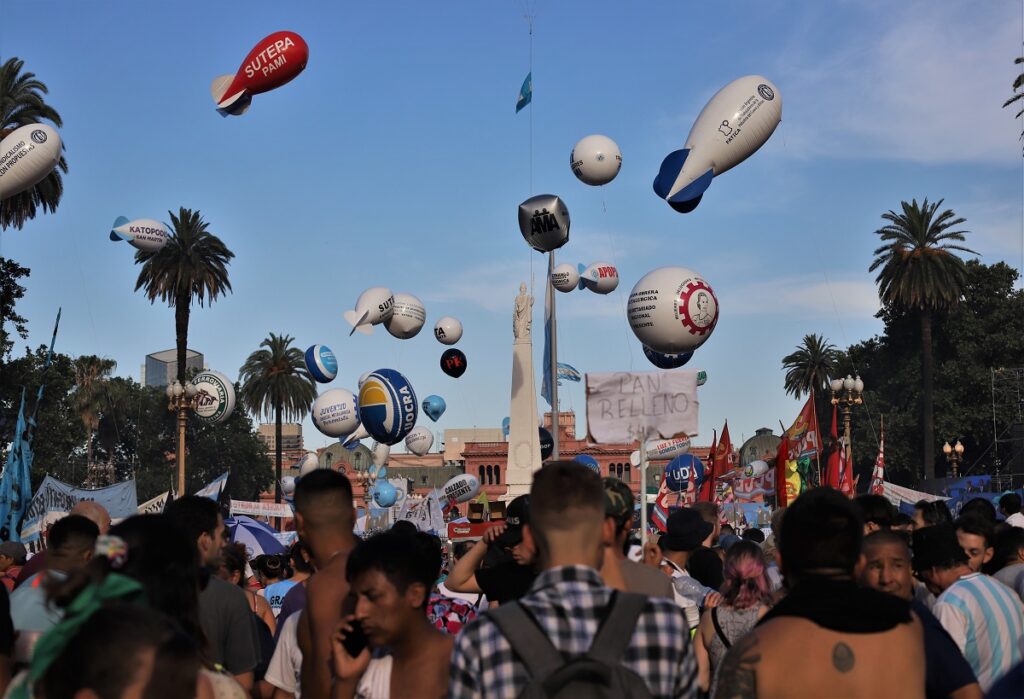
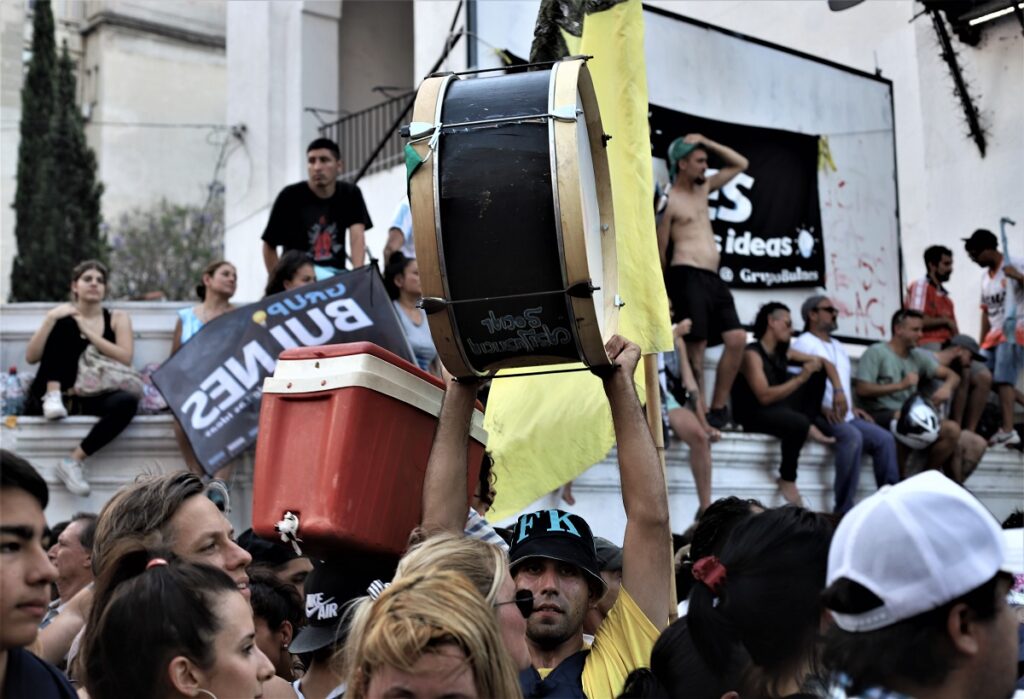
Three months after Fernández assumed power, the pandemic worsened an already extreme situation in Argentina. The government had to negotiate debt repayment with the IMF at the same time as it had to make social investments to face the pandemic. A key presidential document was written: the “present and caring State” of Peronism was going to be opposed to the “neoliberal State”. Initially, national support was massive (the President had 80% approval ratings when he announced the lockdown). However, the amount of social investment the country could afford turned out to be disappointing and insufficient. The Argentinian lockdown was extremely long. The State was present with measures to prevent layoffs by subsidizing private sector salaries. The health system was strengthened. Argentina performed better than her neighbors. However, all of this was done with a lack of hard financing, with ‘printing money’ like everyone else (‘quantitative easing’; See Kalb 2023b), and at the cost of higher private indebtedness. The agreement with the IMF was finally signed off when the pandemic was waning.
Between 2019 and 2021, Merenson and I carried out fieldwork in working-class neighborhoods in the north of the Buenos Aires conurbation and in the south of the city proper. Both areas have a political history of affiliation with Peronism. In one of them, a former enclave of railway workers, they told us that the joy felt at the return of Peronism in 2019 had turned to sadness (Merenson et al., 2022). There was disappointment, anger, uneasiness, lack of hope, and lack of belief in political leadership. Our interviews registered two clear political sensitivities. First, the expression of fear of a repetition of the 2001 Corralito disaster: The restriction of cash withdrawal from banks to USD 250 per week imposed by the government of Fernando de la Rúa on December 1, 2001 in Argentina. The measure triggered the so-called 2001 crisis that led to the resignation of the president, and a situation of macroeconomic destruction and serious sociopolitical instability. Second, the transition of disappointment and weariness into an incipient rejection of all existing political representations. The narratives showed the resurgence of the desire “for all [politicians] to go away”, a key slogan of the 2001 demonstrations. These sentiments heightened when photos of a birthday party at the Fernández’s residence were disseminated while he was asking the nation on TV to sustain the lockdown effort. Perhaps this was the final straw that broke the camel’s back. As we also observed in Brazil and Chile, social sacrifice can only be sustained under a symmetrical exchange pact: parties agree on ways to give, receive, and reciprocate. It is not possible to ask people for so much sacrifice without reciprocity.
While all this was happening, internal conflicts in the Peronist front surfaced and escalated. The vice-president, Cristina Kirchner, and the president, Alberto Fernández, began a two-year-long battle of mutual attacks. Public opinion began to sense that there was no basic consensus on how to govern. The campaign to take office had not included serious negotiations on the directions, perspectives, and visions to be adopted. The third most important figure of the coalition, Sergio Massa (at that time in charge of the Congress of Representatives), began negotiating the conflict between the President and the Vice President, in exchange for being the Peronist front candidate in 2023.
While Cristina and Alberto were publicly airing their mutual grievances, the ministries and state agencies showed increasing difficulties to move forward in any direction. This was, partly because of a lack of consensus and partly because ministerial departments were distributed according to what has been called a “vertical lottery”. Each sector was handed over to different political forces in the coalition, which occupied (almost literally) different floors of each ministry building. There were bitter struggles for the appropriation of resources for different areas and competition for control of the other sectors. What one sector did, the other sector hindered. The government insisted with its publicity on the constant presence of a Caring State, but the daily experience of citizens was that anything that depended on the state was increasingly difficult to solve. It did not take long for the people to express this sentiment: “A present State, yes, but not this one”.
Signing the deal with the IMF (January 2022) caused dissatisfaction within Kirchnerismo and months of attack against the measure (by several representatives of this group) led to the resignation of the Minister of Economy, Martín Guzmán (a man of Alberto’s trust) in July of the same year. Immediately after, an exchange-rate race ensued, with the devaluation of the peso and an inflationary shock. The dollar’s rise provokes a multi-scale economic disaster in a country with no reserves or capacity to take out international credit and which depends on so many imported inputs, paid in dollars, to sustain the productive chains.
After comings and goings of ministers, Sergio Massa took over as Minister of Economy in July 2022, concentrating powers from several ministries and, in practice, displacing Alberto as de facto president. In his inaugurating statement, he promised what he could not deliver: to stabilize the macroeconomy, slow down the exchange rate slide, halt inflation, and accumulate reserves. Between July 2022 and June 2023, inflation went from 71% to 120% annually; the Central Bank’s net reserves went from 5 billion positive to 2 billion in the negative; and official poverty reached 43% of the population. The year-on-year Gross Domestic Product (GDP) growth projections went from 5.2% to minus 3%.
To ensure imports of minimum inputs, the government supports the value of the peso against the dollar with an official exchange rate that is substantially higher than the informal one. Due to the lack of reserves, there are increasing restrictions to access these “official dollars” (as they are called). When Massa took office, the “official dollar” was worth $285 pesos; currently it is worth $365.5. But the dollar circulating in the informal markets (called “blue”) trades at $720 pesos, twice the official value. Faced with this exchange rate gap, the government had to implement other “official” dollar rates to guarantee the flow of different economic activities. Thus, we have the “card dollar” ($639.2 pesos), “tourist dollar” ($721), “MEP dollar” ($657,48), “CCL dollar” ($746,53), and a “wholesale dollar” ($349,98). This monetary situation creates an almost unmanageable complexity for the basic daily activities of all sectors. Recently the Central Bank’s net reserves reached their historical negative record of minus 5 billion USD. A credit from China was agreed to avoid a sharp devaluation of the peso until August’s vote. The loan has been used to curb speculation on the peso, selling cheaper dollars to speculators and trying to bring the various exchange rates down. These constant financial maneuvers and their technocratic explanations do not elicit much trust among the wider population in Sergio Massa, who has overseen them.
The right-wing coalition, Juntos por el Cambio, did no better. Confident that the government’s disaster would ensure a wide-margin victory, the presidential candidates began their own debacle for the position of consensus candidate. Mauricio Macri announced that he would not be running: a reasonable decision given his high rejection rates among voters (Fig.03).
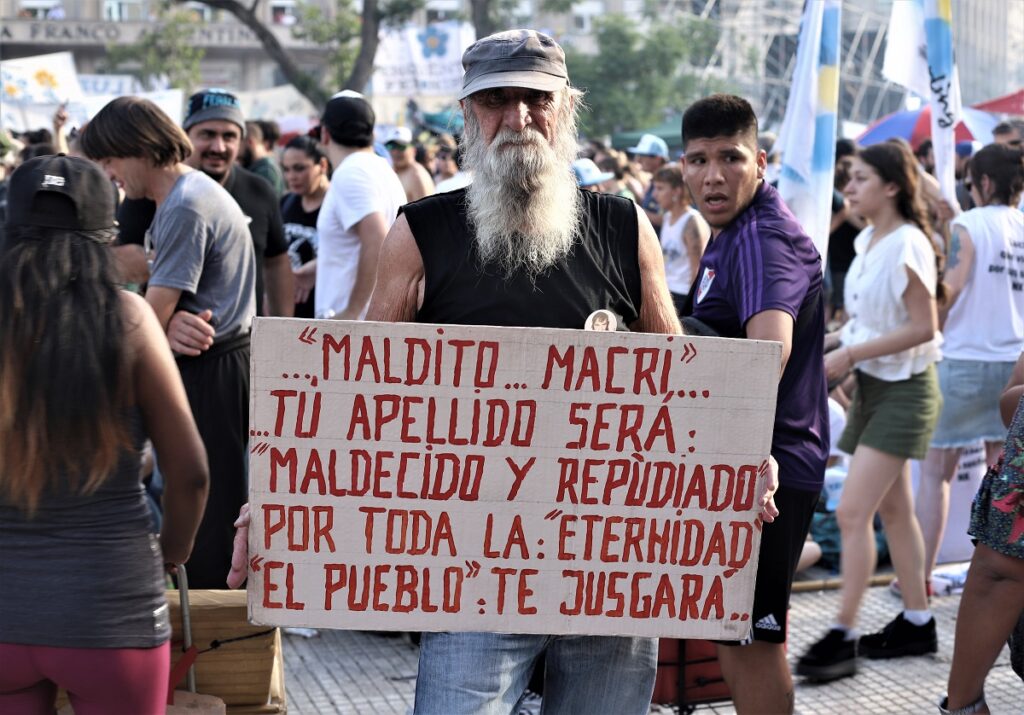
However, Macri started an erratic negotiation with possible successors; Patricia Bullrich, representative of the extreme right, and Horacio Rodríguez Larreta, current head of government of the city of Buenos Aires and representative of a “moderate” right. The fights, cross-accusations, and scandals, were widely reported in the press and led to voter exhaustion for this bloc too.
In the last three months, social suffering has reached new heights. The country is on the verge of a new hyperinflationary shock: it is a train at high speed with no brakes and on a collision course. Pre-electoral polls and focus groups began to point out (especially since June) that Javier Milei (see Focaalblog, https://www.focaalblog.com/2023/05/11/pablo-seman-and-ariel-wilkis-rebellion-of-the-bastards-the-rise-of-the-extreme-right-in-argentina/), an extreme-right candidate running outside the two coalitions that flank the “grieta”, was going to win the most votes in the preliminaries (with obligatory public participation). It is not just an “angry” vote: its thrust is multi-dimensional in terms of political sensitivities. As in Brazil and Chile, people want to believe something different can be possible. There is faith, hope, and the desire to believe in the irrational or improbable. Because everything probable and expected turns out to be too painful, unbearable, and unfair.
On Sunday, August 13, the announcement of the results revealed that La Libertad Avanza [Liberty Advances], Milei’s party, won the most votes (30.1% of the votes), followed by Juntos por el Cambio (28.25%) and Unión por la Patria (27.15%). Milei won by a large margin in districts such as Córdoba, Santa Fe, and Mendoza and a comfortable margin in 16 provinces (Tucumán, Chubut, Jujuy, La Pampa, La Rioja, Misiones, Neuquén, Río Negro, Salta, San Juan, San Luis, Santa Cruz, and Tierra del Fuego). Recent polls for the first round put him in the lead in October’s elections. A victory for Milei would mean a much more serious social and institutional destruction of Argentina than the one Bolsonaro imposed on Brazil. Argentina starts from a much weaker position and Milei’s ultra-neoliberal proposals are much more virulent and aggressive than those of Bolsonaro.
After the PASO results on Monday August 14 Argentina plunged into another exchange rate slide. The government signed an update of the IMF agreement and further devalued the currency. In the working-class neighborhoods of southern Buenos Aires, businesses kept their doors shut until noon. It was impossible to foresee how prices would evolve. At the door of a closed supermarket, a retired woman, unable to buy bread, said in tears, “they all need to go away…”
Menara Guizardi is Adjunct Researcher at the National Council for Scientific and Technical Research of Argentina (CONICET) and an External Researcher at the University of Tarapacá, Chile.
References
Kalb, D. (2023a). Double devaluations: Class, value and the rise of the right in the Global North. Journal of Agrarian Change, 23(1), 204-219.
Kalb, D. (2023b). Two theories of money: on the historical anthropology of the state-finance nexus. Focaal – Journal of Global and Historical Anthropology, no. 95: 92-112
Merenson, S., Sánchez, L., & Guizardi, G. (2022). Imágenes paganas: Recurrencias, emergencias y autoidentificaciones de clase en un barrio ferroviario del conurbano bonaerense (2019-2021). Etnografías Contemporáneas, 8(15).
Semán, P. & Wilkis, A. (May 11, 2023). Rebellion of the bastards: the rise of the extreme right in Argentina. Focaal Blog. Retrieved from: https://www.focaalblog.com/2023/05/11/pablo-seman-and-ariel-wilkis-rebellion-of-the-bastards-the-rise-of-the-extreme-right-in-argentina/ (Accessed: August 20, 2023).
Cite as: Guizardi, Menara 2023 “Notes on the Political Capitalization of Anguish and Hope in Argentina (and the American Southern-Cone)” Focaalblog 24 August. https://www.focaalblog.com/2023/08/24/menara-guizardi-notes-on-the-political-capitalization-of-anguish-and-hope-in-argentina-and-the-american-southern-cone
